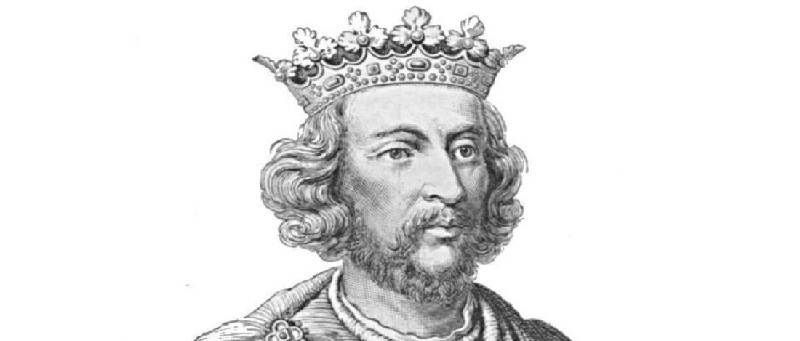Henry III of England
Posted on 4th January 2021
Henry, known as Henry of Winchester was born on 1 October 1207, the eldest son of King John of England and Isabella of Angouleme. Little is known of his early life, but he would have received an education and been given military training.
Henry was nine years-old and staying at Corfe Castle in Dorset when his father King John died. Because of his young age, he was placed in the guardianship of William Marshall, one of the most famous Knights in English history, and a regency council including Hubert de Burgh was formed to rule government.
Henrys coronation took place on 23 October 1216 at Gloucester Cathedral, he inherited a kingdom in a difficult situation during the First Barons War.
Reign 1216 - 1272
Cardinal Guala Bicchieri, papal legate to England wanted to end civil war, punish the rebels and strengthen Henrys position so he set about gaining support from the Papacy. Pope Honorius declared support for the young King and he was given special protection from Rome.
William Marshall agreed to rule by the Magna Carta and reissued it in Henrys name. He slowly managed to get the barons to switch sides and support Henry. He told them not to punish the son for the sins of the father. Louis VIII finally gave up the right to the throne of England and signed the Treaty of Lambeth on II September 1217. The First Barons War was over.
Henry took some control of his government in January 1227, but kept Hubert de Burgh, now Earl of Kent as his Justiciar (chief political and legal officer) during the early years, therefore de Burgh acted as regent.
Reclaiming his lands in France was very important to Henry and he was persuaded to invade France in 1228, however due to his long preparations, he did not invade until May 1230, landing in Brittany. Possibly due to bad advice he received by de Burgh while in France, this invasion achieved nothing. It was very expensive to the English crown and ended in a truce.
Hubert de Burgh fell from power in 1232. Many influential politicians led by Peter des Roches opposed de Burgh, and convinced Henry that de Burgh wasted royal money and lands. Hubert de Burgh was arrested and imprisoned in the Tower of London. Peter des Roches now took over the Kings government, but he was unpopular with the barons and started stripping them of their lands.
Richard Marshall, son of William accused Henry of failing to protect baron’s legal rights. Before an agreement could be made Richard Marshall, died in battle, however with the intervention of the Archbishop of Canterbury, Henry agreed to the dismissal of Peter de Roches. Henry would now, from 1234 rule his kingdom personally.
Henry was determined to secure a suitable political marriage and after considering various candidates he chose Eleanor Of Provence. After the marriage contract was agreed, Eleanor travelled to England to meet her future husband. Henry and Eleanor were married in January 1236 at Canterbury Cathedral and Eleanor was crowned at Westminster shortly afterwards. Their marriage produced five children, the first a son, Edward.
Eleanor brought many family members the ‘Savoyards’ to England with her. Many were given positions in government and others had marriages arranged for them. The English barons were not happy with the influence and power the’ Savoyards’ were gaining over England and yet Henry continued to shower honours on them, maybe to please his formidable wife.
Henry also encouraged members of his own extended family the ‘Lusignans’ to return to England. To many, he gave large estates and lands, which caused controversy in England.
Henry had done much to alienate his barons and they were to rebel against him, led by Simon de Montfort, husband of Henrys sister Eleanor.
In 1258 seven leading barons forced Henry to agree to the Provisions of Oxford, a series of measures by which a council of members would oversee the administration of government. It is often regarded as the first written constitution of England. Further laws were passed, led by Simon de Montfort with the Provisions of Westminster in 1259.
Henry revoked the laws passed, causing the relationship between himself and de Montfort to deteriorate, finally leading to the Second Barons War in 1264.
De Montfort was victorious against Henrys army at the Battle of Lewes on 14 May 1264, where Henry and his son Edward were captured. Simon de Montfort was now in charge of the government.
Henrys son, Edward escaped captivity in 1265, raised an army and defeated de Montfort at the Battle of Evesham on 4 August 1265, where de Montfort lost his life.
Henry now exacted revenge on the barons that had supported de Montfort, depriving them of their estates and possessions.
Following both the First and Second Barons War, Henrys later reign was dominated by stabilising his kingdom after rebellion. He died on 16 November 1272 and is buried at Westminster.
Henry is not remembered as a good King, but as a weak man and a failure, both politically and militarily. He is however also remembered for the rebuilding of the Westminster Abbey we have today.
Tagged as: Junior Middle Ages
Share this post:





